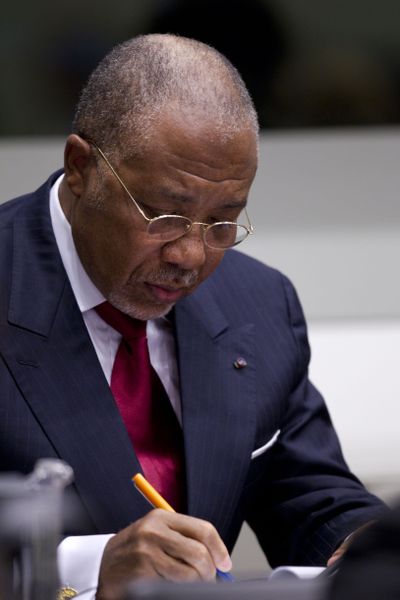Former Liberian leader guilty of war crimes

LEIDSCHENDAM, Netherlands – Former Liberian President Charles Taylor became the first head of state since World War II to be convicted by an international war crimes court, a historic verdict that sends a message that tyrants worldwide will be tracked down and brought to justice.
The warlord-turned-president was found guilty Thursday of 11 counts of war crimes and crimes against humanity for arming Sierra Leone rebels in exchange for “blood diamonds” mined by slave laborers and smuggled across the border.
Judges at the Special Court for Sierra Leone said Taylor played a crucial role in allowing the rebels to continue a bloody rampage during that West African nation’s 11-year civil war, which ended in 2002 with more than 50,000 dead. Ten years after the war ended, Sierra Leone is still struggling to rebuild.
The rebels gained international notoriety for hacking off the limbs of their victims and carving their groups’ initials into opponents and even children they kidnapped, drugged and turned into killers. The rebels developed gruesome terms for the mutilations that became their chilling trademark: They would offer their victims the choice of “long sleeves” or “short sleeves” – having their hands hacked off or their arms sliced off above the elbow.
The 64-year-old Taylor will be sentenced next month after a separate hearing.
The court has no death penalty and no life sentence. Judges have given eight other rebels as much as 52 years in prison.
The verdict was hailed by prosecutors, victims and rights activists as a watershed moment in efforts to end impunity for leaders responsible for atrocities.
The ruling “permanently locks in and solidifies the idea that heads of state are now accountable for what they do to their own people,” said David Crane, the former prosecutor who indicted Taylor in 2003 and is now a professor of international law at Syracuse University.
U.N. Secretary General Ban Ki-moon hailed the judgment as “a significant milestone for international criminal justice” that “sends a strong signal to all leaders that they are and will be held accountable for their actions,” said U.N. deputy spokesman Eduardo del Buey.